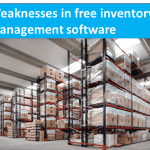The growing mass of data generated by businesses is a real challenge.
The lack of effective tools to identify trends hidden in the large amounts of information1 often prevents companies from identifying strategic information critical to their competitiveness.
Fortunately, technology now makes it possible to meet this gap using Business Intelligence tools that are capable of producing detailed analyses.
What is Business Intelligence?
Business Intelligence aims to design and build software tools capable of analyzing business data in order to detect strategic information. The identification of new facts then leads to a decision that reflects the actual situation of the company.
Business Intelligence in SMEs
Business Intelligence (BI) is gaining popularity among small and medium-sized enterprises. SME managers are indeed convinced of the need for the reporting of quality data.
Nevertheless, a number of SME managers are still reluctant to adopt such tools. They fear that these tools will reveal information that might challenge their decisions. In addition, staff can be very reluctant and slow to change the system as well since BI involves questioning the bases underlying all the previous decisions.
However, beyond these reasons, the Business Intelligence tools were until recently poorly adapted to the needs and limited resources of SMEs. Therefore, for a long time, only large companies benefited from BI’s solutions.

Growing Popularity
In a survey, that was led in 2012 by the Gartner firm, IT managers were asked about Business Intelligence. The results revealed that BI constituted an essential priority to these professionals due to:
-
- the rapid pace of technological change;
-
- the high quantity of business information produced on the daily (which requires analyzing this data to make better decisions); and
-
- the need to remain competitive in this ever-changing industry
The concluding point of this survey is that the IT decision-makers were indeed in favor of the adoption of Business Intelligence tools.
Affordable Solutions
The arrival of affordably priced software suites on the market, such as erpwizard®, explains the enthusiasm of SME managers for Business Intelligence.2
The Benefits of Business Intelligence for SMEs
Small and medium-sized businesses, that adopt a Business Intelligence solution, reduce their costs and increase their profitability.
In favoring this adoption for better strategic decisions, Business Intelligence will also give these companies a competitive advantage. Companies now have the capacity to analyze their huge amounts of data, which is an important aspect of a business that most failed to do beforehand due to their lack of resources.
A Smart Solution – “erpwizard”
The advent of the deployment in the cloud, SaaS mode, represents a revolution for small and medium-sized enterprises.They can finally adopt a high-quality Business Intelligence server where the quality-price ratio is far superior than other solutions offered in less advanced models.
The company can always decide to opt for a deployment “on the premises”, if it has the means. If not, it will choose to deploy SaaS for a monthly subscription fee (per user).
The management solution is particularly interesting in that the server is not hosted in the company, but instead on our private servers in a data center with maximum security, at no extra cost. The company thus saves on personnel, accommodation as well as software maintenance costs.
Would you like to enjoy the benefits of a Business Intelligence solution designed specifically for you?
1 Commonly called data mining
2 BRAUD, Olivier. Facteurs décisionnels pour l’implantation d’un ERP dans les PME : le rôle de l’évaluation des bénéfices tangibles et intangibles, Montréal, Université du Québec à Montréal, p. 14.



